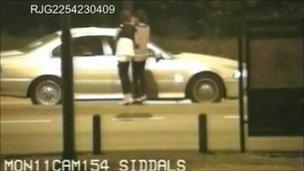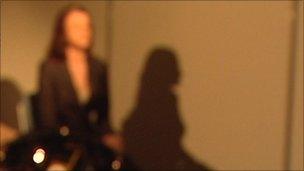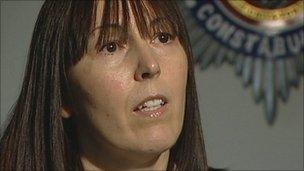Derby rape gang 'targeted children'
- Published

CCTV images showed some of the men approaching teenage girls on the street
It started, as many police investigations do, with a routine car check.
In Staffordshire, officers pulled over three men and were concerned to see two young teenagers with them. They had been reported missing from a care home in Derby.
It was not long before the newly created sexual exploitation unit at Derbyshire Police was alerted and Operation Retriever began.
What the officers uncovered now stands as one of the most serious cases of sexual abuse in recent times. After three separate trials, carried out in secret, nine men have been found guilty of offences ranging from rape to intimidating witnesses. Their victims totalled 27 teenage girls.
'Under the radar'
Two of the men in the car were Abid Saddique and and Mohammed Liaqat. Both had families and, it became apparent, both had secret lives.
They were released but put under surveillance. Council CCTV camera footage given to the BBC shows their silver BMW driving around Derby after midnight looking for teenage girls.
Spotting a pair by the side of the road, they made repeated attempts to entice the girls into their car. Police later found bottles of vodka and plastic cups hidden under the seats so victims could be offered a drink.
Officers had been monitoring the live cameras, ready to step in if any girl got into the car.
On 24 April 2009 the surveillance abruptly ended when two tearful teenagers stumbled out of a Derby flat police were watching and called 999. They claimed they had been raped. The officers had not known they were there.
In statements the girls not only made forceful accusations against Siddique and Liaqat but also named other girls the pair had abused.
That became the pattern. Each victim led to more victims. Eventually police had a list of 27 teenage girls and they arrested 13 men, aged between 26 and 38.
Det Supt Debbie Platt, who led the police investigation, said: "I was personally shocked at the scale of the abuse we uncovered. It hadn't been reported and it was happening under the radar.
"It was like a campaign of rape against children. When you see the impact these offences have had on them it is awful."
The girls had been carefully groomed by their abusers. Typically they would meet them on the street, be invited out for a drive, a drink, a cigarette or drugs. They would be driven to a secluded area, a park, or one of the rented houses the men lived in, and forced to have sex.
Sometimes five or six men would be involved and they would video the attacks on mobile phones. The rapes were often violent, some girls were locked up to prevent them getting away. Others were thrown out of the car when their ordeal was over.
Searching one of the flats, officers found extensive forensic evidence that the rapes had taken place.
Internally trafficked
One 16-year-old victim described the grooming in a BBC interview: "There's part of you that thinks I've met this lovely nice man and he's taken me out for a lovely nice meal and there's part of you that looks at these men like a father figure, as weird as it sounds."

One of the victims described her abusers as "low-life people"
Police believe no money changed hands between the dozen or so men involved but the girls were driven around the Midlands to be raped in houses, hotels and B&Bs. It was a form of internal people trafficking now recognised to be a growing problem in the UK.
Another worrying aspect to this case is the way in which the two key offenders deliberately targeted children who seemed vulnerable.
The 16-year-old victim said they took advantage of "the fact that no-one does care".
"I think they are low-life people," she said. "They haven't got any aspirations in life and I will never ever understand what has made them so evil and ignorant that still to this day they think they've not done anything wrong."
One of the girls was in a care home, another with council foster parents and many were known to social services in the city.
There are now questions about why they were allowed out at night, sometimes going missing, and whether the various agencies worked well enough together to protect them.
Warning signs
A serious case review, similar to those following the deaths of baby Peter Connelly and Khyra Ishaq, will be published shortly.
Baby Peter died in August 2007 at his home in north London after months of abuse, while seven-year-old Khyra died in May 2008 after being being found in an emaciated condition at her home in Birmingham.

Det Supt Platt says child protection has focused on younger victims in their own homes
Many of those involved in the field of child sexual exploitation see the Derby rapes as a landmark case. The charity, Barnardo's, which works with victims of abuse has long campaigned for better training so professionals can spot the warning signs.
The girls disappeared overnight or for several days and may have generated missing persons reports. They had older boyfriends and received repeated mobile phone calls from the abusers.
Det Supt Platt says in recent years child protection has focused on younger victims in their own homes.
"Whether the abuse is a young child within the home or a vulnerable 14-year-old outside the home, it's still child abuse and we do need a nationally co-ordinated response to address both types of abuse," she said.
This case came after others in Rochdale, Preston and Rotherham, where groups of Asian men had been found guilty of grooming and raping girls.
The Operation Retriever officers decline to draw conclusions from the ethnicity of the group. "Look at the sexual offenders list," said one senior officer. "It's mainly white men."
But police agree these cases may suggest a willingness for abusers with shared ethnic backgrounds to work in gangs, rather than alone.
- Published24 November 2010